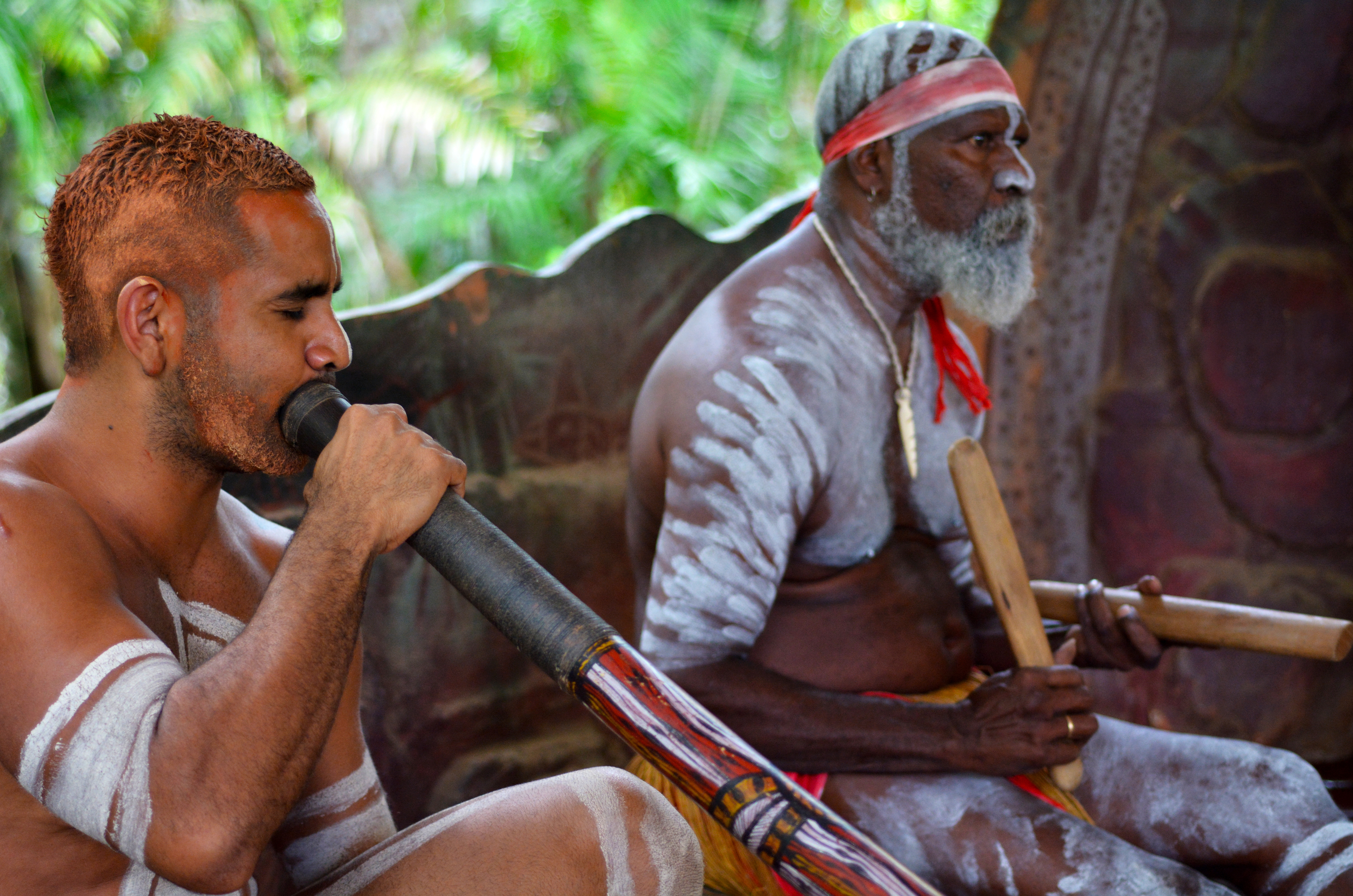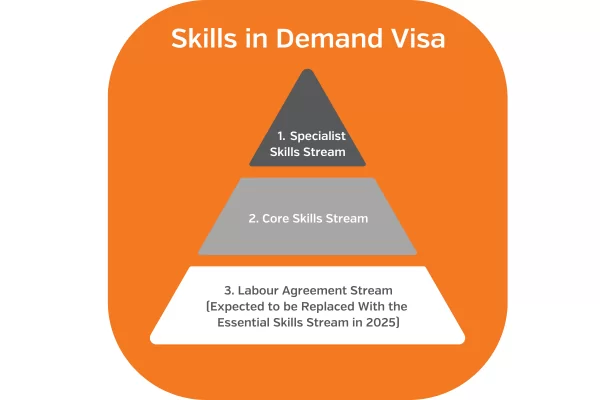Australia’s New Skills In Demand Visa | National Innovation Visa | Core Skills Occupation List

Several pieces of legislation commenced last weekend to introduce the new Skills in Demand (SID) and National Innovation Visas, which are now in effect. Here’s what you should know: Features of the new Skills in Demand Visa Including Transitional Arrangements; Existing Temporary Skills Shortage (TSS) Visa Holders | Changing Employers; The New Core Skills Occupation List (CSOL) | Occupations Added/Removed; Caveats for Specific Occupations | CSOL; Business Feedback on the Skilled List Changes
Written by Sheila Woods (MARN: 0533879) of Interstaff 12 December 2024
Features of the New Skills in Demand (SID) Visa
The below features of the Skills in Demand (SID) Visa have been legislated and are now in effect. The visa permits up to a 4 year term.
The SID Visa has replaced the TSS Visa while retaining the same Subclass 482 Visa category number.
Three Streams | A Tiered Migration System
1.) Specialist Skills Stream
- For applicants earning $135,000 or more (the ‘Specialist Skills Income Threshold’ – indexed annually).
- Available for any occupation except trade workers, machinery operators, drivers, and labourers.
2.) Core Skills Stream
- For applicants earning the ‘Core Skills Income Threshold’ – $73,150 or more (in line with the previous Temporary Skilled Migration Income Threshold – TSMIT that applied to the TSS Visa), which will be indexed annually.
- Occupation must be listed on the Core Skills Occupation List – a new list introduced to consolidate the three prior occupation lists that operated under the TSS program.
3.) Labour Agreement Stream
Retains settings from the TSS Visa until the Government finalises the proposed Essential Skills Stream.

Reduced Work Experience Requirement
- Applicants must have at least one year of full-time relevant work experience (reduced from 2 years) or the equivalent in part-time or casual work.
- Work experience must be within 5 years before the visa application date.
Permanent Residence (PR) Pathways
- SID Visa holders will have a pathway to PR under the Subclass 186 Visa – Temporary Residence Transitional (TRT) Stream.
- Full-time paid and sponsored work in the same occupation in Australia will count towards Subclass 186 Visa TRT Stream two-year employment period requirements.
- Existing flexibility for specific occupations, such as medical practitioners and certain executives, continue to apply.
- The nominated occupation for a Subclass 186 TRT nomination must be the same as the applicant’s recently held 457, TSS or SID Visa.
- Salary requirements for the Subclass 186 Visa ensure applicants must be paid at least the SID Visa Core Skills Income Threshold.
- The requirement for family members to be included in the Nomination application for a Subclass 186 Visa in order for the visa to be granted has been removed.
Sponsorship Obligations
- Existing sponsorship obligations for the TSS Visa apply to the SID Visa.
- Changes to visa conditions implemented in July 2024 to provide greater mobility provisions continue to enable workers to change employers more easily.
- Visa holders who cease work with their sponsoring employer have up to 180 days at a time (an increase from 90 days) and a maximum 365 days across their visa period to find a new sponsor, apply for a different visa, or depart Australia.
- To support this, the employer’s obligation to ensure the primary sponsored person works in their nominated occupation ends when the worker ceases employment for them, rather than when they obtain a new sponsor.
Transitional Arrangements for Applicants with a Pending Application
- TSS Visa applications made before 7 December 2024 will be processed under TSS Visa legislation. Applications made after this date are processed under the new SID legislation.
- An exception to this is if an employer lodged a Nomination for a TSS Visa without submitting the corresponding visa application before 7 December 2024. In these cases, the Nomination may be linked to the new SID Visa until the original Nomination period of 12 months ceases.
- Amendments to legislation for the Subclass 186/187 Nomination and Visa ensure that where a Nomination was lodged before 7 December 2024 and work experience requirements were met, they do not also have to be met at the Visa application stage.
English Language Requirements and SID Visa
- English language test requirements for the Specialist Skills and Core Skills Streams are the same as what had applied under the Medium Term Stream of the TSS Visa. This raises the bar for employer-sponsored visas, which previously allowed a lower English standard for TSS Visa holders under the Short Term Stream.
Skilling Australians Fund (SAF) and SID Visa
- The Nomination Training Contribution Charge (NTCC) of the Skilling Australians Fund (SAF) that applied to the TSS Visa also applies to the SID Visa.
Existing TSS Visa Holders | Changing Employers
Existing TSS Visa holders may change to a new employer if their current occupation is on the CSOL or if their Nomination application meets the income requirements for the Specialist Skills Stream.
If a worker’s occupation is not on the CSOL or does not qualify for the Specialist Skills Stream, they may not have a pathway to change employers. Instead, they may be able to utilise the Skills in Demand Visa mobility provisions to find work in a new occupation, seek another visa, or depart Australia.
The New CSOL | Which Occupations Have Been Added and Removed?
In addition to others, several agricultural, arts/creative, finance, laboratory, health, social/welfare, hospitality/retail and sports occupations were removed such as:
- Beef Cattle Farmer, Crop Farmers (nec) and Livestock Farmers (nec)
- Conference and Event Organiser, Dancer or Choreographer and Graphic Designer
- Financial Brokers nec, Financial Dealers nec and Economist
- Medical Laboratory Scientist, Medical Laboratory Technician and Pathology Collector \ Phlebotomist
- Chiropractor, Emergency Service Worker and Nurse Manager
- Welfare Centre Manager and Child Care Centre Manager
- Cafe or Restaurant Manager and Customer Service Manager
- Footballer, Jockey and Sportspersons nec
A number of cyber security, technician, trades, travel, social/welfare and hospitality/retail occupations were added such as:
- Cyber Governance Risk and Compliance Specialist, Cyber Security Analyst and Cyber Security Engineer
- Agricultural and Agritech Technician, Electronic Engineering Technician and Telecommunications Technician
- Beauty Therapist and Technicians and Trades Workers nec
- Tour Guide, Travel Agency Manager and Travel Consultant
- Child Care Worker and Out of School Hours Care Worker
- Hospitality, Retail and Service Managers nec and Retail Manager (General)
The Core Skilled Occupation List (CSOL) includes occupations that are eligible* for the:
- Core Skills Stream of the SID Visa or;
- Direct Entry Stream of the Employer Nominated Scheme (ENS) / Subclass 186 Visa (Permanent Residence)
*Caveats apply under some circumstances for particular occupations.
The CSOL is a consolidated list and replaces the previous Short Term Skilled Occupation List (STSOL), Medium to Long Term Skilled Occupation List (MLTSOL) and Regional Occupation List (ROL), which applied to the TSS Visa prior to 7 December 2024.
The CSOL comprises 456 occupations. According to the Migration Institute of Australia,125 occupations were removed from previous lists, and 16 occupations were listed with new or changed ANZSCO occupations.
While ANZSCO categories are used in the CSOL, it is worth noting that the Government plans to transition to OSCA (Occupation Standard Classification for Australia) categories – a new system for classifying occupations. It is unclear when or how this will apply to the Core Skills and other visa occupation lists.
Occupations added to the CSOL list represent new opportunities for employer-sponsored work in Australia, whereas removed occupations are not eligible for the Core Skills Stream of the SID Visa or the Direct Entry Stream of the Subclass 186 Visa.
If you or your team are impacted by a removed occupation, Interstaff can provide professional advice on other skilled visa options that may be suitable.
For example, in some instances an applicant may be able to apply under the Specialist Skills Stream of the Skills in Demand Visa, which does not require an occupation to be on a list, but requires a minimum guaranteed salary of $135,000 (excluding trades workers, machinery operators, drivers and labourers). If the position is in regional Australia, a Subclass 494 Regional Provisional Visa may be available. Independent skilled pathways may also provide visa options.
Caveats For Specific Occupations | CSOL
The CSOL currently has 16 caveats that apply to specific occupations. Some caveats limit the use of a particular occupation under certain work circumstances. Others, such as Caveat 14, were included as a result of an International Trade Obligation (ITO).
There has been some confusion on how Caveat 14 applies to chefs. While Caveat 14 in the CSOL states: ‘The position is not provided for under an International Trade Obligation’, the Department of Home Affairs has clarified with the Migration Institute of Australia (MIA) that they do not intend for this caveat to limit the use of the chef occupation to countries where Australia has an ITO in place.
According to the MIA, the Department will seek to amend the legislative instrument to clarify this and in the meantime, it will not prevent applications of Chefs being lodged or granted on the basis of nationality.
However, Caveat 14 may limit the use of the below occupations to countries where Australia has an ITO in place:
- Other Sports Coach or Instructor (Wushu Martial Arts Coach or Yoga Instructor Only) – as it is a Skill Level 4 occupation, which would otherwise not be included on the CSOL; and
- Private Tutors and Teachers nec and Traditional Chinese Medicine Practitioner -whose inclusion on the CSOL was not supported by labour market or stakeholder feedback to Jobs and Skills Australia.
Should you require professional advice on how caveats apply, please get in touch with our team.
Business Feedback on the Skilled List Changes | CSOL
While the construction industry has largely welcomed the decision to include core trades on the skills list, it also expressed criticism.
Master Builder’s Association Chief Executive Officer, Denita Wawn criticised the Government for excluding builders earning over $135,000 and key machinery operator roles, such as crane operators, bulldozer drivers and excavator operators, which are not eligible for either the Specialist Skills Stream or Core Skills Stream of the SID Visa.
According to the National Tribune, the Business Council of Australia says the Government should consider calls to expand the list and add labourers, machine operators and drivers to the fast-track Specialist Skills Stream of the new SID Visa.
The New National Innovation Visa
The new National Innovation Visa is designed to attract highly skilled and talented migrants to drive investment in key sectors of the Australian economy. It has now replaced the Global Talent Visa – you can read more about the new National Innovation Visa here.
Most of the requirements that applied to the Global Talent Visa will apply to the National Innovation Visa, which indicates the replacement is effectively a re-branding of the Global Talent Visa.
Changes to the visa requirements involve:
- Requiring an invitation by the Minister before applying for a National Innovation Visa.
- Holding the same internationally recognised record of exceptional and outstanding achievement at both the invitation stage and time of application.
- No requirement to seek endorsement by the Prime Minister’s Special Envoy for Global Business Talent Attraction for being likely to make a significant contribution to the Australian economy.
The above amendments apply to new applications for the National Innovation Visa on and from 6 December 2024.
Applicants that applied for a Global Talent Visa before 6 December 2024 will continue to have their application assessed under the previous legislation for Global Talent Visas.
Established in 1988, Interstaff has over 35 years of Australian visa and migration experience and provides strategic immigration advice to businesses and individuals Australia-wide and internationally. MARN: 0533879.
